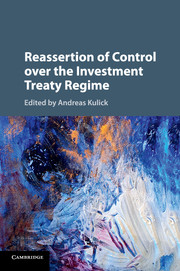Book contents
- Frontmatter
- Contents
- List of Contributors
- Preface
- PART I Introduction, Theory and Domestic Law Approaches
- PART II Procedural Aspects and Avenues of Reassertion
- 4 Early Dismissal of Claims in Investment Arbitration
- 5 Keeping the Status Quo or Embarking on a New Course? Setting Aside, Refusal of Enforcement, Annulment and Appeal
- 6 State-State Investment Arbitration as a Means of Reassertion of Control: From Antagonism to Dialogue
- PART III Substantive Aspects and Avenues of Reassertion
- PART IV Reassertion of Control: Policy and Trends
- Index
6 - State-State Investment Arbitration as a Means of Reassertion of Control: From Antagonism to Dialogue
from PART II - Procedural Aspects and Avenues of Reassertion
Published online by Cambridge University Press: 12 January 2017
- Frontmatter
- Contents
- List of Contributors
- Preface
- PART I Introduction, Theory and Domestic Law Approaches
- PART II Procedural Aspects and Avenues of Reassertion
- 4 Early Dismissal of Claims in Investment Arbitration
- 5 Keeping the Status Quo or Embarking on a New Course? Setting Aside, Refusal of Enforcement, Annulment and Appeal
- 6 State-State Investment Arbitration as a Means of Reassertion of Control: From Antagonism to Dialogue
- PART III Substantive Aspects and Avenues of Reassertion
- PART IV Reassertion of Control: Policy and Trends
- Index
Summary
A. Introduction
International investment agreements (IIAs) usually provide for both investor-State and State-State arbitration without any further indication as to the relationship between the two. Standard State-State arbitration clauses permit any Contracting Party to seize a tribunal to settle any ‘dispute’ with another Contracting Party as to the ‘application or interpretation’ of the respective IIA. Such broad wording opens various possibilities for conflict with investor-State arbitration, for example, if the investor's home State introduces a parallel diplomatic protection claim or if the investor's host State and respondent in the investor-State arbitration resorts to State-State arbitration in order to settle a matter of interpretation that is pertinent in the investor-State dispute. Beyond the issue of parallel proceedings, questions arise as to the effect of a State-State award, particularly pertaining to interpretation of the IIA in subsequent investor-State arbitrations where the interpretation of the same IIA clause is relevant for resolving the investor-State dispute. Are State-State interpretation awards binding on investor-State tribunals operating under the same IIA, do they only have to consider them or can they even completely ignore them? Depending on the answer to this and similar questions, State-State arbitration inheres a considerable potential for the Contracting Parties to reassert control over the IIA and/or investor-State arbitration – usually rather unilaterally than jointly.
This chapter first sets out a typology of State-State claims based on their potential for a Contracting Party's reassertion of control (Section B). Thereinafter, Section C will lay the groundwork for developing principles governing the relationship between State-State and investor-State arbitration by presenting five premises defining the architecture of such relationship. Section D first sets out and elaborates on the five principles that, to my mind, govern the interaction between the two different forms of arbitral dispute settlement that most IIAs offer (Section D(1)). Second, the chapter presents the consequences that in my opinion should emanate from such principles and that should crystallise, so I contend, into a judicial dialogue between State-State and investor-State tribunals operating under the same IIA (Section D(2)).
B. A Typology of State-State Claims
A Contracting Party to an IIA that introduces State-State arbitration proceedings may do so for a number of different reasons and in pursuit of a number of different purposes.
- Type
- Chapter
- Information
- Reassertion of Control over the Investment Treaty Regime , pp. 128 - 152Publisher: Cambridge University PressPrint publication year: 2016
- 7
- Cited by



